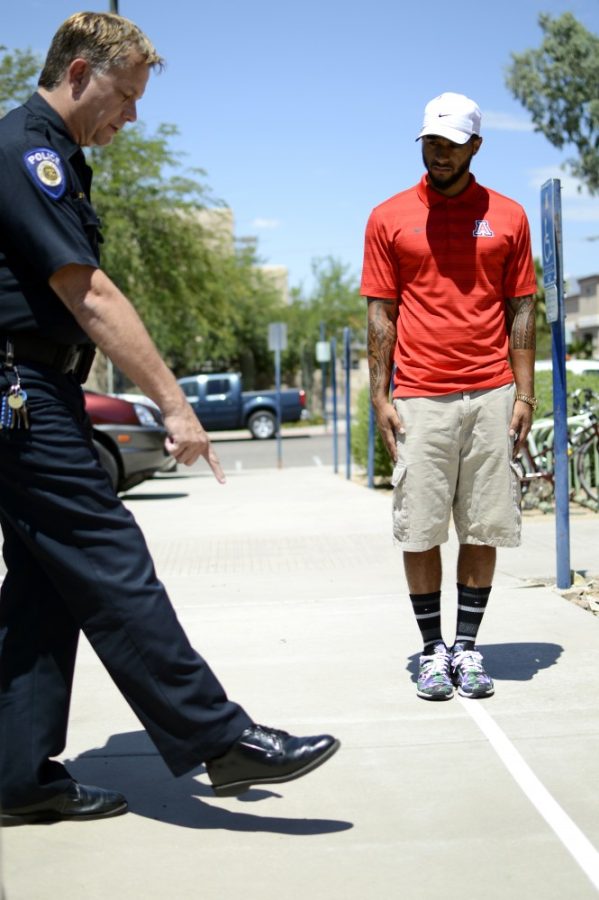A recent study by WalletHub named Arizona the strictest state in the country for the enforcement of driving under the influence rules.
Arizona was ranked No. 1 in criminal penalties and No. 2 in prevention, with an overall rank of No. 1 as the strictest state for DUI enforcement.
To determine the rankings, WalletHub looked at over 15 different measurements such as the minimum jail time and minimum sentence for the first offense, additional penalties for a higher blood alcohol content and if vehicles are impounded after arrest.
States earned points depending on these kinds of criteria, and the point totals determined the rankings. Arizona scored 84.09 percent with Georgia coming in second place with 70.45 percent, according to the WalletHub study.
Arizona’s high ranking in strict DUI enforcement doesn’t surprise University of Arizona Police Department Officer, George Eppley.
Eppley worked for the Tucson Police Department’s DUI unit for 13 years before he worked for the UAPD.
According to Eppley, one of the largest contributing factors to Arizona’s strict ranking is the statewide DUI task force, and that Arizona also has a zero tolerance policy with DUI enforcement.
With a BAC of 0.08 percent or higher, drivers may lose their driving privilege and have to complete screening for alcohol or drugs before they can reinstate their driving privilege.
A first offense means at most, 10 days in jail and hundreds of dollars in fines, as well as required alcohol screening and education.
Drivers must also equip their vehicles with a certified ignition interlock device which tests the driver’s breath for alcohol and is connected to the vehicle’s ignition. They are also ordered to perform community service, according to the Arizona Department of Transportation.
The state DUI laws and penalties are the same, even when given by a UAPD officer. DUI charges also do not fall under the Dean of Students Office’s diversion program, according to Eppley.
Eppley also said that he hopes the strictness of DUI laws will deter people from driving under the influence and that there has been a lot of education provided to spread the message to drink responsibly.
Lynn Reyes, an alcohol and other drug prevention specialist with Campus Health, said that it can be hard to tell if DUI laws can be a deterrent.
“I know when I’m working with students individually they often have a story to tell about a friend and they see what their friend has gone through and they don’t want to go through that,” Reyes said. “In that sense, I hope it’s a deterrent.”
UAPD works with the state task force for DUIs, especially during holidays, Eppley said.
He said UAPD participates in the DUI task force and they sometimes concentrate mostly on surface streets around the outside of campus, such as Speedway Boulevard and Euclid Avenue, because that’s where most of the DUIs near the UA occur.
During 2015, UAPD did 88 DUI arrests, according to Eppley. Although, most of the DUI enforcements do not have someone tied to the UA involved, Eppley said. The UA’s central location in the city means that people drive through the UA area. Campus-related traffic stops aren’t usually where officers find DUIs.
READ: UAPD to collaborate with TPD’s Red Tag Unit
Some students, like accounting junior Kelsey Kraft, don’t think DUIs are as a big of a problem at the UA compared to colleges in other states, like California.
According to the minor in possession citation data from last school year’s Health and Wellness Survey, which surveyed 3,100 randomly selected undergraduate students, 3.1 percent of students received MIPs.
In the past, the survey asked students about DUIs, but since the DUI numbers were low, the questions about DUIs were dropped from this past survey. Because of this, there is no current data for DUIs from the Health and Wellness Survey.
“You can kind of see just from MIPs,” Reyes said. “That number is so low that you might imagine DUIs are even lower because not everybody has a vehicle.”
Reyes said that many students who live in residence halls tend to not have cars and many of the students she works with use Uber.
Eppley said that he has found more designated drivers driving when making traffic stops.
“The numbers [of DUIs] are probably down a little bit than what they used to be because throughout the years, citizens here have learned that there is zero tolerance,” Eppley said.
Reyes said that the students who responded to last year’s survey said that in the past 30 days, they used a designated driver 91.3 percent of the time.
Reyes said, while that number is good, there is still room for improvement.
“I think the improvement would come from students themselves, where friends don’t let friends drive,” she said. “I hear a lot of students say they take away a friend’s keys and won’t let them drive or they help them to get home. I think that will make a difference.”
To avoid driving under the influence, students should arrange to have someone pick them up, have a designated driver or use a cab or service such as Uber, Eppley said.
Follow Ava Garcia on Twitter.









